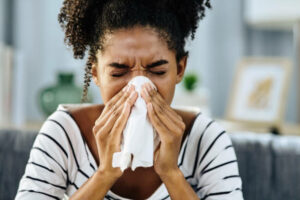This week (22nd-28th April) is Spring Allergy Awareness Week 2024 in the UK, with a mission to raise awareness of allergies and ensure they are taken seriously.
 As allergies begin to affect more and more of the population, Allergy UK is taking the opportunity this Allergy Awareness Week to highlight the fact that allergies are #toobigtoignore and will soon affect all of us.
As allergies begin to affect more and more of the population, Allergy UK is taking the opportunity this Allergy Awareness Week to highlight the fact that allergies are #toobigtoignore and will soon affect all of us.
Allergy Awareness Week has been observed annually since 1998. Since then, the UK has witnessed many changes, but Allergy UK argue one thing that hasn’t moved on “is an attitude which fails to understand allergy as a serious disease.”
The leading national charity explains:
“We still live in a world where people think hayfever is just a sniff, a food allergy is a lifestyle choice, a skin allergy is just a bit of dry skin, and respiratory allergies like pet and mould allergies are just because people are a bit sensitive. All against the backdrop of allergies affecting more and more people.”
Allergy Awareness Week puts spotlight on top UK health condition
In fact, the charity says 1 in 3 people are already living with an allergy in the UK, but this is soon expected to increase to 1 in 2, by 2026.
They also cite the following statistics which prove that allergies are too big to ignore:
- Allergies were the number 1 reported health condition in the UK in 2022
- 50% of children are affected by one or more allergies
- There has been a 154% rise in hospital admissions due to anaphylaxis in the last 20 years
- Over 5 million individuals in the UK require specialist care for severe allergies
- The UK ranks in the top 3 globally for the highest incidence of allergies, second for allergic eczema and joint first for hayfever
 This is why Allergy Awareness Week is an important campaign, with Allergy UK providing a range of free campaign resources for people to download to get involved, educate themselves and others, show their support and help spread the word that allergies are #toobigtoignore.
This is why Allergy Awareness Week is an important campaign, with Allergy UK providing a range of free campaign resources for people to download to get involved, educate themselves and others, show their support and help spread the word that allergies are #toobigtoignore.
It is hoped that schools, workplaces, community organisations, families and individuals will learn about allergies, engage in conversations and raise awareness of the impact they have on people living with allergic disease.
Supporters can also make donations to enable Allergy UK to continue to provide vital services to people with allergies and their families, including their Helpline.
Allergy UK also welcome details of lived experiences during Allergy Awareness Week. They say that these “shed light on the impact allergies have on individuals, families and communities and foster understanding and empathy,” and so they encourage people to share “inspiring stories of resilience, triumph and support […].”
The charity hopes that Allergy Awareness Week can have an impact that lasts year-round, becoming “part of a movement to build a more compassionate, informed, and inclusive society in relation to allergy.”
Allergy Awareness Week highlights impact on NHS and individuals
In addition to #toobigtoignore, they also use the hashtag #timetotakeallergyseriously to drive home their message and help create a future where all people with allergies feel “safe, supported and understood […].”
It makes sense in the context of a stretched healthcare system, with Allergy UK highlighting the impact that allergies have on NHS services in the UK:
- 8% of all GP appointments relate to allergic conditions
- Managing asthma patients – of which, 80% also have hayfever, which acts as a trigger – costs the NHS £1.1 billion a year
- Allergies account for 60,000 hospital admissions and 200,000 bed days each year for the NHS
- In 2014, 15% of asthma deaths had hayfever identified as a contributing factor
- Managing allergies costs the NHS £900 million a year
Allergies also have a huge impact on the individuals living with these conditions. For example:
- Allergic eczema is responsible for nearly 25% of patients losing at least 15 workings days each year
- People living with allergic eczema are also often forced to spend up to an hour each day just managing their eczema
- People living with food allergies typically have to spend 14% more on their grocery shopping than those without food allergies
- 42% of parents caring for a child with a food allergy meet the clinical threshold to be diagnosed with Post-Traumatic Stress Disorder as a direct result of their child’s allergies

These issues can lead to people living with severe allergies developing anxiety, stress, depression and other mental health concerns linked to their condition.
Children and young people with allergies may also experience isolation and bullying as well as a negative impact on their educational attainment and job prospects.
Allergy UK continues to support the allergic community throughout the year with helpful information, guidance, a dietitian service, helpline, allergy alerts and translation cards for navigating allergies during foreign travel.
Allergy education and training
First Response Training (FRT) is a leading, national training provider. They deliver over 7,000 courses each year in the fields of health and safety, first aid, fire safety, food safety, mental health, health and social care and other special focus topics.
Their portfolio includes the Level 2 Award in Allergy Awareness, Anaphylaxis and Emergency Medication as well as training in Inhalers and Nebulisers.
Common signs and symptoms of allergic reactions can include:
- Sneezing and/or an itchy, runny or blocked nose
- Itchy, red or watering eyes
- Shortness of breath, wheezing, tightness in the chest and/or a cough
- Raised, itchy red rash
- Swollen lips, tongue, eyes or face
- Nausea
- Worsening of asthma or eczema symptoms for those who have these conditions
Signs and symptoms of anaphylaxis may include:
- Difficulty breathing or speaking
- Coughing or wheezing
- Feeling faint, lightheaded or dizzy
- Abdominal pain, nausea and vomiting
- Loss of consciousness
Anaphylaxis is a medical emergency; you must always call an ambulance if you suspect someone is experiencing anaphylactic shock.
Some of the most common allergens include:
- Grass and tree pollen (an allergy to these is known as hayfever)
- Dust mites
- Animal skin or hair
- Food – common food allergens include nuts, shellfish, eggs, cow’s milk, gluten, soy or types of fruit
- Insect bites and stings
- Medication, such as ibuprofen, aspirin and certain antibiotics
- Latex
- Mould
- Household chemicals, such as those found in detergents
If you live with an allergic condition or are supporting or caring for someone with an allergy, you may need to consider the following useful tips for helping to manage allergies:
- Practice good housekeeping by keeping your environment clean and tidy. This is particularly important for people who suffer with mould and dust mite allergies
- Use an air purifier to reduce any airborne allergens
- Ensure you have stock of relevant emergency medication where appropriate and that you are aware of how to use it correctly. Schools are able to keep stock of spare adrenaline auto-injectors to use in emergency situations without the need for a specific prescription for a specific child. If you work in a school, make sure you are aware of the guidance. For milder allergic reactions, antihistamines may help. Always consult a pharmacist and read the package instructions and guidance
- When preparing food, ensure you ask other diners if they have any food allergies or intolerances. If someone does have a food allergy, you must ensure the allergen is not present in the food and that equipment used to make the food does not come into contact with the allergen. For some severe food allergies, even being in the same room as the allergen can trigger a reaction
- Provide emotional support for people living with allergic conditions, as many will experience anxiety and stress linked to their allergy. You can help to alleviate anxiety by providing a safe environment and you can also practice positive strategies for managing anxiety, such as mindful breathing or muscle relaxation
If you suspect you or someone you care for may have an allergy, you should contact your GP in the first instance. You can find out more information about allergies on the NHS website.
A trainer from FRT says:
“Allergies can be very serious and can impact every aspect of a person’s life.
“It is therefore very important that people have an awareness of allergies and the signs and symptoms of an allergic reaction. Training and information are particularly important for those who are responsible for taking care of others, whether adults or children. Prompt action is vital when someone has a severe allergic reaction.
“We support Allergy Awareness Week and their calls for better awareness and improved allergy services and support for people living with allergic conditions.”
Download our free ‘Managing Allergies’ infographic with advice and guidance about helping to manage allergies or support people living with allergies.
For more information about the training available, please call FRT today on freephone 0800 310 2300 or e-mail info@firstresponsetraining.com.
